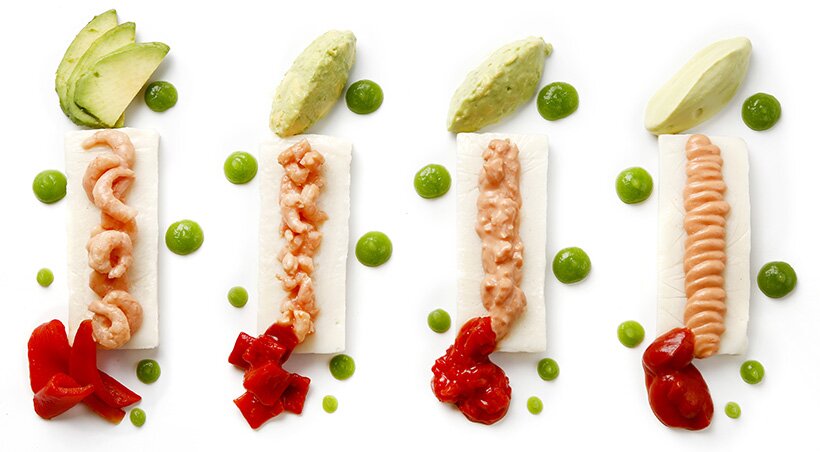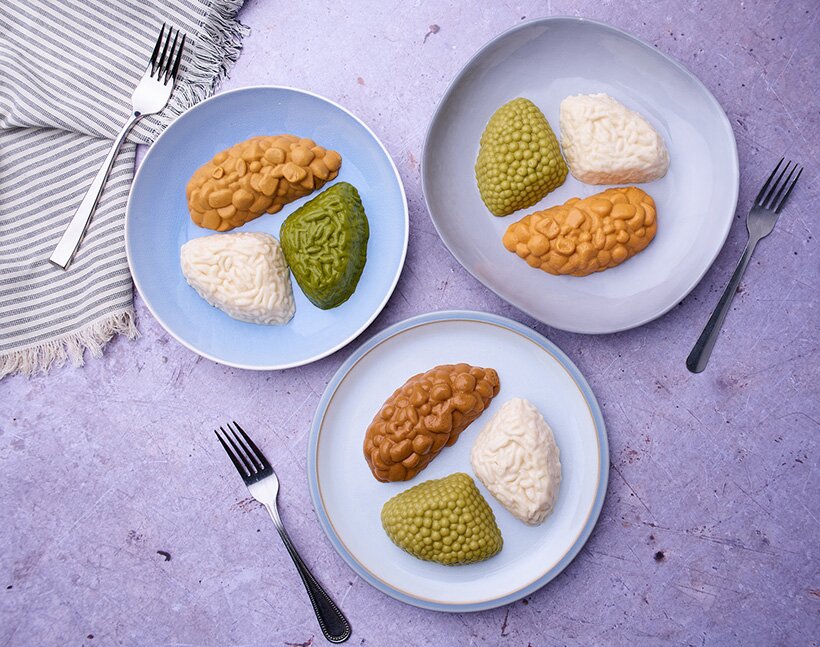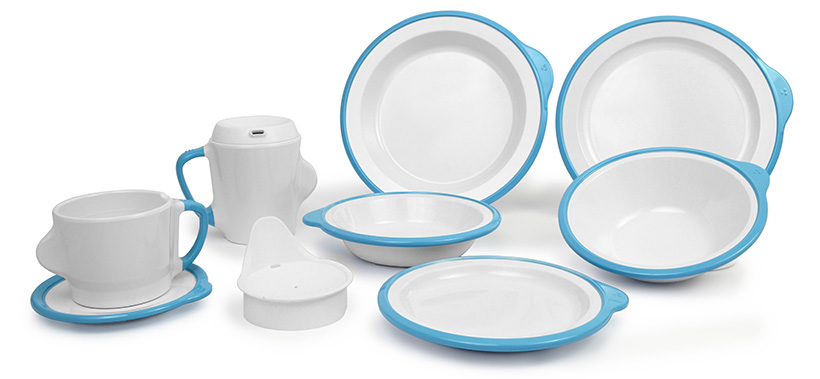A helping hand: the latest developments in care catering
Catering in the care sector presents the problem of creating food that is healthy, nutritious and easy to eat as well as being attractive and whetting the appetite, but chefs are solving that in a range of innovative ways. Lisa Jenkins finds out more.
Care homes bring a set of challenges for caterers, in particular the need for texture-modified foods for residents with dysphagia, or difficulties swallowing.
Samantha Rain, development chef at meals provider Henley Bridge, explains: “Care catering is an area of foodservice like no other. It’s a rewarding yet challenging field and juggling the complex medical and dietary demands of residents, while at the same time providing varied, appealing and nutritious menus, can be overwhelming.

“Fortunately, the category is undergoing something of a revolution, and at Henley Bridge we are leading the way, offering a wide range of innovative products, which can be tailored specifically to suit the care catering sector.”
The Henley Bridge development chefs have created a bank of recipes specifically for people with dysphagia, including a ‘posh prawn sandwich’ that can be modified to suit the International Dysphagia Diet Standardisation Initiative (IDDSI). The framework is made up of eight levels, where where drinks are measured from levels 0-4, and foods are measured from levels 3-7. All care settings in the UK must now adhere to the standards. For example, Henley Bridge’s posh prawn sandwich can be served at level 7 (below left) down to level 4 (below right).

Texture-modified foods can be created with the Sosa range of gelling agents and thickeners, such as Sosa Gelcrem Cold, which is a thickener that can create the texture of custard in cold conditions, without the need to add gelling agents.
Hospital meals provider Apetito is also catering to the dysphagia market, having recently launched 10 new market-leading texture modified meals in its Culinary Inspirations range.
The range of IDDSI Level 5 meals feature a moulded protein element, which aims to stimulate and entice patients’ appetites. New dishes include salmon in dill sauce, beef in gravy, beef grill steak, and vegetable and West Country Cheddar cheese bake. The company has also introduced a new rice mould to its Level 4 Purée Petite softer foods range. Rice is challenging to fully purée due to its texture and high starch content.
The new dishes, which are all served with the rice, have at least 500 calories and 15g protein in each 275g portion, with options including beef chilli with kidney beans; sweet and sour chicken with pineapple and peppers; and chicken tikka masala.
Apetito’s Rosemarie Hoyle, divisional manager – healthcare, explains: “When it comes to first impressions, food presentation is paramount and we understand how important it is for patients to dine with dignity, no matter their dietary needs.
“Everything we do here at Apetito seeks to make a real difference to customers and patients, offering unparalleled food quality and assured safety standards. For us, this range is all about offering choice and innovation and, importantly, bringing enjoyment back to mealtimes for those with dysphagia.”
Joel Carr, development chef at Young’s Foodservice, says that the business’s priority is to “create nutritious, cost-effective and versatile solutions that can be prepared quickly and conveniently,” emphasising “the numerous health benefits that eating seafood can bring”.
The Young’s Foodservice range includes non-fried products, oily fish and gluten-free battered fish, all using MSC-certified fish. Young’s skinless and boneless battered fillets are coated in a signature chip shop-style batter, to provide care home residents with a traditional fish and chip experience.
Rebecca Manfredi, managing director of Suncream Ice Cream, says: “Ice-cream allows those who suffer with dysphagia to still enjoy desserts, while allowing care caterers to have the confidence that residents and patients will be able to eat safely.
“Choosing a premium ice-cream flavour with no inclusions offers a smooth texture and a consistency that is safe and easy to swallow.”
Suncream offers a rich Cornish Gold ice-cream and a Love Vegan range, which consists of three flavours: natural vanilla bean, chocolate with chocolate ripple sauce and strawberry with strawberry ripple sauce.
Nutrition and tradition
The challenges for care caterers don’t end with dysphagia, with many residents having complex dietary needs.
“Older people are vulnerable to dehydration due to physiological changes in the ageing process, such as a reduced sensation of thirst, which can be more pronounced in those with Alzheimer’s disease or in those who’ve suffered a stroke,” explains Henley Bridge’s Rain.
“A great way to improve hydration is to offer fruit jellies. Trials have suggested that people with dementia are more likely to eat a sweet than have a drink, and you can make a variety of flavours to suit all tastes. We use Léonce Blanc Fruit Purées, which come in a wide range of flavours. The purée is set using Sosa Vegetal Setting Powder.”

Scott Oakes, commercial manager for Baker Street, part of the St Pierre Groupe, agrees that highly nutritious options are a vital part of care catering, and emphasises the importance of dessert options: “There’s much more to desserts than sugar-filled, calorific options. In fact, in a care home setting, the dessert menu offers a wealth of opportunities to provide residents with nutritious, appealing and fulfilling dishes and help meet the fundamental requirements of the Care & Quality Commission’s Regulation 14.”
Baker Street has a range of ready-made solutions for care homes, including pre-baked sponge flan cases and sponge cake layers.Available in cases of 10, the flan cases serve eight people per unit. A fruit tart or flan is visually appealing, colourful and engaging without compromising on nutrition and soft and gentle to eat.
Crockery and flatware
Omni is a specialist dinnerware range designed for the health and social care sectors. Created by Dalebrook Supplies, the range incorporates subtle design features that empower those who have difficulty in using traditional crockery. Omni features high-contrast coloured plates with a wide rim and muscle memory sensory points, along with a support handle for single-handed grip. Silicone anti-slip feet on the plates and internal walls on the bowls act as a food bumper for those with limited dexterity and co-ordination. Made from 100% melamine, Omni is dishwasher-safe and keeps food and drinks warm.

Meals on Wheels
Meals on Wheels has been in existence since 1943, and was created to deliver meals to individuals at home unable to purchase or prepare their own. Seventy-seven years later, the value and need for the service, particularly since the Covid-19 pandemic, has never been stronger.
The pandemic has seen an increase in the number of vulnerable people in the community, who are confined to their own homes and reliant on others. In response, an army of heroes has stepped up. From established Meals on Wheels services, to pubs, restaurants and cafés that transferred their skills and facilities, these volunteers have all worked tirelessly to deliver nutritious food to those in need. They’ve also ensured those who are isolated benefit mentally and emotionally, whether from a friendly smile or a chat, all within the social distancing guidelines.
The National Association of Care Caterers (NACC) is a longstanding champion of Meals on Wheels and has launched a social media campaign to celebrate its work. The #mealsonwheelsheroes campaign gives Meals on Wheels teams up and down the country the recognition, praise and thanks they deserve.
The NACC is calling on everyone to declare their support and gratitude for Meals on Wheels by downloading a thank you poster at www.thenacc.co.uk, and posting a selfie with it, alongside the hashtags #mealsonwheelsheroes and #morethanjustameal, and tag in the NACC.
Sue Cawthray, national chair of the NACC, said: “The pandemic has highlighted a need that’s always been there. The elderly and vulnerable living independently in the community are at risk of malnutrition and social isolation. These issues existed long before Covid-19 became part of our everyday language, but they have been exacerbated and spotlighted by the pandemic.
“Talking to our members, the onset of lockdown brought about an increase in demand of up to 30%. As it became difficult for care teams to visit clients or relatives to support their loved ones, the vital role Meals on Wheels services play in the community gained greater recognition. As well as delivering a daily nutritious meal, it also delivered important wellbeing checks and a friendly face to break the loneliness, which was intensified by lockdown.”
Contacts
Apetito www.apetito.co.uk/our-services/for-hospitals/patient-health-and-wellbeing/
Baker Street lovebakerstreet.com or www.stpierregroupe.com/
Dalebrook Supplies www.dalebrookonline.com
Henley Bridge www.bit.ly/3iWvjbn
National Association of Care Caterers (NACC) www.thenacc.co.uk
Young’s Foodservice www.youngsfoodservice.co.uk


















